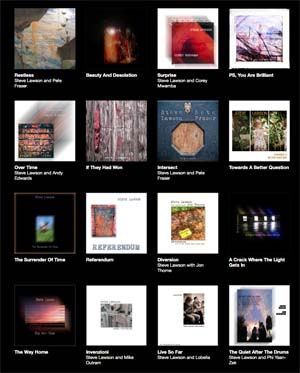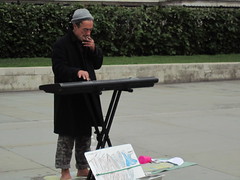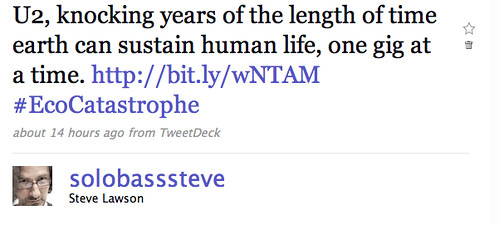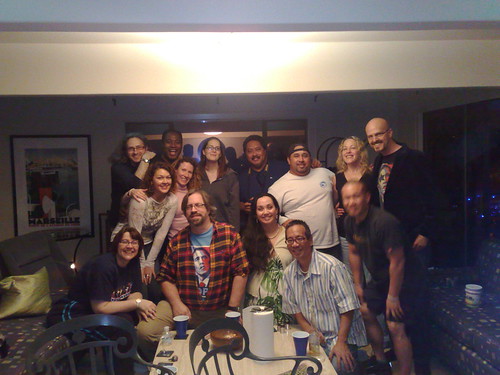Yesterday I wrote about what Bandcamp offers me as a music fan. Today it’s all about how I use it as an artist.
First some background: My solo career started before the age of download sales. My first 6 albums were all pressed as CDs, and sold via a range of online eCommerce solutions – from a shop set up by my friend Tim to help his friends sell their CDs, to CDBaby, back when it was offering a truly revolutionary solution for independent artists trying to work out how best to leverage the internet for global reach. The streaming media of choice was Real Audio – generally terribly low res, but it was the stuff that generated enough interest in my music to result in me turning those live recordings into my first album! When download sales became a thing and CDBaby worked out a deal to get our music onto iTunes, I did that too, and slowly onto the other emerging download stores – Amazon, Google Play, eMusic… I also had a self-hosted download store of my own, and mistakenly sold 128k MP3s from it… I was learning all along and made a number of fairly heinous mistakes.
Then in 2008 Bandcamp came along. I still had my hand-rolled sales site, so it took me a few months to sign up, but from mid 2009, I started selling my music on there. Immediately, the possibilities became apparent. The first things I uploaded were my existing albums, and added CD sales too, but then in mid 2010, Lo and I were on a house concert tour in the US, I’d just bought a MOTU soundcard, and we’d worked out how to multitrack record all our gigs (Geek facts: I was running Reaper on a Hackintosh’d Dell MINI 10v, and recording EIGHT TRACKS!) As the tour progressed, I was mixing the live recordings on off-days, and uploaded the first six tracks of what straight away promised to be our first updateable album. Live So Far ended up being 10 tracks long, captured a number of lovely spontaneous musical happenings along the way, and helped fund the tour as it progressed. When we eventually made a limited edition CD run, we sold that on Bandcamp too.
My first solo album to come out on Bandcamp was 11 Reasons Why 3 Is Greater Than Everything. I experimented with pricing that scaled over time, with free download codes, and found that there was a direct link between streaming numbers and sales – the more people heard it, the more were likely to buy it. So I just kept directing people to Bandcamp to hear it – no 30 second previews, no tricking people into buying shit they might not like. Just ‘here, fall in love with this…’ – and they did. Because, as we know, music is the one artform you’re more likely to spend money on it the more you experience it – listening to an album a lot so rarely causes us to get bored of it. Listening to it a lot is evidence that it means a lot to us, so encouraging people to do that invests it with increasing levels of value, not decreasing. This flies in the face of music marketing logic, but the clever people at Bandcamp understood it and we’ve been leveraging it ever since. The flipside is, of course, that a ton of people have been able to audition my music to see if it was for them and decide not to buy it, but that’s great too – I have no interest in subsisting on the poor choices of people conned by duplicitous marketing…
My next album was another live album – recorded in Minneapolis, Believe In Peace was the first album I put out exclusively on Bandcamp. In all honesty, I think I intended to put it out on all the other platforms, I just never got round to it. I was having way too much fun getting to know the people who were discovering the music.
This was possible because Bandcamp really values the relationship between artists and listeners. It has the option to have an email link on your page, it gathers together the email addresses of everyone who buys your stuff, allowing you to stay in touch with them via whatever platform works best for you. It has built in ‘tweet this’ links for albums and at the sales completion stage, and it has fan collections where you can see everything that someone has bought.
The value of this is SO much greater for niche artists than a bunch of algorithmic aggregate data. Because it’s about forming relationships not gathering information. I know what my listeners like because I follow the fan account of everyone who subscribes to me. I find a LOT of music because of their discoveries getting passed on to me. I can see what really works for them in my catalogue by how they review it – and in the stats portion of the Bandcamp For Artists App – or in the case of the subscribers by how they comment on it in the subscriber discussion thread. They’re real people not data points that represent financial transactions from months ago. I have no idea who it is that buys my music on iTunes each month (I get about £20 every couple of months from them) – I don’t know who they are or what they like. But with Bandcamp, I get to learn a bit about them.
 And I get to enrich the experience of my listeners with extra info. Every Bandcamp album page has a section for a description that I fill up with sleeve-notes – I accompany everything I release with an essay. Sometimes I write track-by-track explanations of what’s going on, and I bundle those with the download as a PDF and include in the lyric field for each track. Everything gets uploaded as 24bit audio, and the listener can decide what resolution and file type works for them, knowing that whatever they get, it’ll have all the correct metadata and info with it, and they won’t be left having to pay more for a high res file like it’s 2003 or something…
And I get to enrich the experience of my listeners with extra info. Every Bandcamp album page has a section for a description that I fill up with sleeve-notes – I accompany everything I release with an essay. Sometimes I write track-by-track explanations of what’s going on, and I bundle those with the download as a PDF and include in the lyric field for each track. Everything gets uploaded as 24bit audio, and the listener can decide what resolution and file type works for them, knowing that whatever they get, it’ll have all the correct metadata and info with it, and they won’t be left having to pay more for a high res file like it’s 2003 or something…
Because there are few digital things that annoy me as much as buying music with either messed up – or no – metadata. Selling WAV files is completely insane, given how hard it is to attach info to them, or embed artwork (can you embed artwork in a WAV? I’ve never ever had one arrive with track data embedded, let alone artwork) – FLAC sounds identical (is genuinely lossless) but has fields for all the info you could ever need.
I occasionally get asked why I don’t run my own download site, but having never ever seen one where the experience for the buyer is even a quarter as good as Bandcamp, it strikes me as a really bizarre question. Running a successful ecommerce business if you want to sell multiple file types and resolutions with accurate metadata, streaming possibilities, payment options and have the audience trust what you’re doing is such a massive, massive task, there’s really no reason to think that it’ll be worth the 10% you’ll ‘save’ by not having Bandcamp do it. But you’ll also almost certainly make less money. Because all the stuff I said yesterday about how I find music applies to how people find me. Bandcamp is such an incredible discovery platform. It makes it so easy to share music, to find things, hear them, follow a trail of connections, browse what other people are listening to… You’ll see the players littered throughout this post and the last – imagine trying to code all the possible variations yourself. Imagine hosting all that bandwidth, imagine trying to build a platform in which your fans can show off how much they love your music on a page of their own. You can’t imagine doing it, because what you’d be imaging is Bandcamp, and it already exists.
Five years ago, I realised that my shift to all-improv shows was producing a crazy amount of release quality music. That set-up I’d started with in 2009 that allowed me to multitrack gigs had been refined with every single gig, getting better and better recordings, getting better at mixing… I did a mastering course to learn how to make the end product better, and in 2013 released a 10 album set of live recordings (all exclusively on Bandcamp), and was able to do a presale for them, sell the USB Stick physical bundle, and offer download codes to my collaborators so they could use them to add value to other sales, or just sell full sets of download codes at gigs. The pricing was wholly variable, and we could do discount codes and sales and free download days and…
Well, I’d started to meet up with Ethan Diamond, the founder of Bandcamp, every January while in California, and he mooted their idea to launch a subscription service. I was asked what kind of features I’d want, and I was then invited to be one of the three artists who trialled it, and I properly found the home for my musical output. I didn’t want what some of the subscription services were offering in terms of charging my subscribers more if I released more, instead I wanted to be able to increase the sense of value for them over time if I happened to make more great music. Gratitude is the essential currency of the indie music economy. People will pay for things they are grateful for. I didn’t want to be releasing music for the sake of it, just music that was amazing, so the actual promise of the subscription is about a third of what I actually put out in a year – the extra 200% on top is there because it deserves to be there, not because I feel obliged to release it…
But I now get the economic latitude to mix and master every quality gig that I do, release it and tell the story of its genesis. I get to throw it out to the subscribers for discussion, offer them exclusive video, essays about the motivation and technology behind the music, and even eBooks about playing music, or my novel. It’s my ever-expanding digital box set, but without the crazy premium cost that comes with reissues of classic albums.
The community of subscribers is now big enough that they almost cover our rent for the entire year. I’m about 30 subscribers short of covering it all at this point. That for me is a sustainable practice. I’m not having to pay for billboards or Facebook ads, or trying to get radio play for particular tracks or promoting a single with a promo tour… I get to make albums that I’ll never be able to play live, release them and get on with the next one. I recently put out three albums in a month, because I did three gigs that were really, really good. Subscribers got them all, and even though not many of them had time to digest all that music there and then, it’s theirs for good. They own it, whether or not they remain as subscribers. And we get to revisit not only the music, but the story that those three gigs tell in aggregate. John Coltrane would record multiple albums in a week, Miles Davis recorded Agartha and Pangea on the same day, but they were released detached from that context – presented purely as ‘albums’ not as episodes in a longer story…
I’m not trying to get rich, I’m not trying to be famous, I don’t want the audience of hundreds of thousands of listeners that I’d need to make Spotify sustainable. I really don’t. I love having a community of people who are invested in what I’m doing that I can talk to about it, that I recognise when they turn up to gigs, that I get birthday messages from, who make suggestions about what the music means to them…
Back in mid 2016, one of my subscribers sent me a set of incredibly detailed notes he’d taken about how he understood what I was doing as an improvisor and performer. It was meticulous and filled with care and attention, and he’d written it while in hospital, I still get emotional thinking about it. He died not that long after he sent it, but the sense that somehow I’d ended up in this space where the people who find the music not only get to enjoy it but may want to spend time thinking how it represents new ways to think about music making and why we release music was such an inspiring one. The feedback I get from my subscribers is irrevocably woven into the way I make music, and the permission I get from them to continue on this path is a motivator like no other.
Bandcamp is the mechanism that makes all of this possible. It doesn’t force it to happen, and I’ve not found that many other musicians who’ve managed to leverage its affordances to the same degree (I know a lot of people who sell more music than me on there, but not as many whose music life is as heavily entwined – maybe my commitment to it as a music listener as well has helped build those relationships…)
I can’t at this point imagine wanting to release music any other way. I’d rather wait til someone eventually finds a way to buy it on Bandcamp than pander to whatever preconceived notions they have about where they want to find music. The idea that we have to be ‘everywhere’ in order to reach our audience is only true if you don’t see the experience of your music as concretely wedded to the context – the words, the connection, the artwork, even the delivery mechanism. So if you currently buy music on iTunes, that’s OK, eventually you may decide that your desire to investigate my music is strong enough that working out what Bandcamp does is worthwhile. But if it doesn’t, I don’t feel any burning need to water down the experience of my music in order to put it out in an inferior form in a worse context.
I’d love it if you subscribed to me on Bandcamp. The current offering is (I think) 47 albums the moment you sign up, and then everything I release in the next 12 months – go check it out, and have a listen to the albums throughout this article to see if any of it takes your fancy. If it does, come join the party – you’ll be a tangible part of the sustainability revolution.






